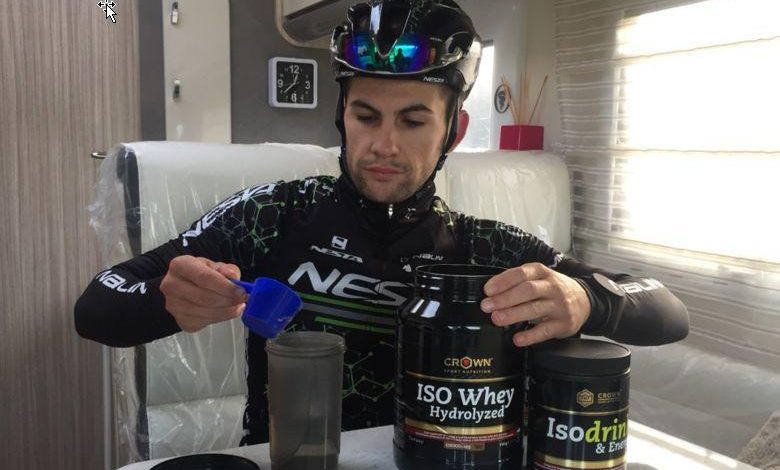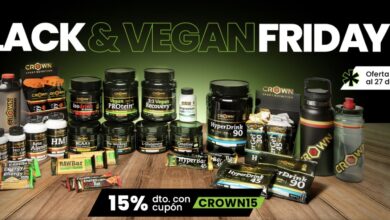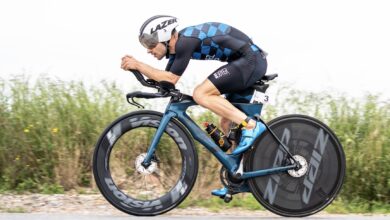Can nutrition help us recover better from injury?
We give you some guidelines so you know how and why good supplementation is interesting if you have an injury

As usual in this section, our collaborator in sports nutrition Crown Sport Nutrition he has been giving us a series of useful tips to improve our sports performance through food.
This article, written by Fernando Mata from NutriScience Spain (currently CEAN group), explains how through good nutrition the time of injury can be shortened.
Face the recovery from injury from a nutritional point of view its main objective is keep the athlete in the best possible condition so that the return to training is done in the best possible conditions.
It is clear that this depends a lot on the type of injury you have, but there is something common in all of them, the objective of minimize muscle tissue atrophy and the consequences of inactivity.
When do we start to lose muscle mass?
The first weeks of an injury, the main objective is to minimize atrophy, although it is necessary to take into account other changes that can occur such as the loss of muscle mass.
This fact has been studied using computed tomography, it has been observed that in the quadriceps in just 5 days there is a tendency to lose almost 5% of the transversal session area, ie approx. 1,5% lean mass approximately.
In addition, to this we must add that there is a 10% loss of strength In the same period and if the injury does not allow a return to activity, the loss continues to increase.
It is for this reason that nutrition is a very important factor and must be monitored from the first moment of the injury.
Another study carried out in 2007 by Boer and Col, analyzed what happened with the synthesis of muscle protein from the immobilized leg.
They observed that it tends to decrease for 10 days and then stabilizes. It is also accompanied by loss of the transverse sitting area of the muscle.
The tendons also suffer
It should be borne in mind that this process also occurs to the tendon. Protein synthesis decreases continuously, as does its rigidity.
Taking only protein with me?
A muscle reduces protein synthesis due to a decrease in sensitivity to anabolic stimuli such as those that come from amino acids in proteins (anabolic resistance).
In another study by Wall et al. (2015) did a test with 12 young men who had their leg immobilized with a cast, which was given 5 grams of whey protein for 25 days.
When the muscle protein synthesis of the control group was compared to that of immobilization, the immobilized leg responded 50% less than the non-immobilized one.
This showed that just adding protein there is not much influence on the decrease in protein synthesis of immobilized muscle.

Electro-stimulation and nutrition, a good combination
Some years ago Dirk et al (2014) published in Acta Physiologica an article where it was observed how uusing neuromuscular electro-stimulation for 40 minutes, twice a day, showed that it was enough to minimize loss of the muscle cross-sectional area.
These same authors published another study where they analyzed strategies to combat muscle disuse in humans, focusing on the neuromuscular electrical stimulation and protein.
Although electro-stimulation attenuated the loss of muscle mass more than protein intake alone, the effect was summative when both strategies were applied.
Therefore, if the muscle is stimulated, this will we add a protein intake greater than 2 grams / kg / day, It would be proper strategy to address this first phase of the injury and thus avoid muscle atrophy.
At this point it is important to choose a quality protein with a high load of leucine and administer them evenly throughout the day.
Omegas 3
This type of fatty acids can be a good ally in recovery, although it is true that there are some limitations
In order for omegas to be able to increase muscle protein synthesis and attenuate muscle loss, large amounts are required and also an intake for at least 2-3 weeks prior to injury.
As it is impossible to know when an athlete is going to be injured, the important thing is to add them to the diet at the time of injury.
For it to take effect we need some time and high doses, so it is advisable to have this type of supplement in the diet throughout the year.
Creatine
Colaborating creatine it is very interesting in order to avoid the loss of muscle mass.
In a study published in 2009 in the Journal of Strength Conditional Research, Johnston et al. selected a group of 7 young men who underwent a crossover protocol during arm immobilization and received either placebo or 20 g of creatine per day (4 x 5 g per day).
The results showed a significant reduction in muscle mass with creatine intake, and the study data even showed a certain increase, perhaps associated with creatine load.
However, an attenuation in strength was observed with creatine supplementation.
Vitamin D
Some micronutrients like vitamin D have to be evaluated and have to be kept at optimal levels.
This vitamin intervenes in the process of muscle regeneration so it can be interesting to speed up recovery from injury.
Other nutrients such as polyphenols, which are present in fruits and vegetables, help to control a possible excess production of free radicals during the acute phase of the injury, which can contribute to a greater loss of muscle mass.
In summary, what can I do to avoid losing muscle mass?
- Consume protein quality (about 2,3 g / Kg of body weight and day) distributed in several meals throughout the day with the same amount
- Control total energy intake. A low consumption can promote the loss of muscle mass.
- Take omega 3 present in food such as blue fish.
- La creatine can help the injury recovery process.
- Monitor the vitamin D levels and, in case it is insufficient, supplement.
- Add to diet rich fruits and vegetables in polyphenols.
We recommend you
Whey Protein with a plus of Leucine and Glutamine. With Informed Sport anti-doping certificate.
Creatine Monohydrate is creatine monohydrate which is scientifically proven to be the most effective of the existing creatines.
There are no previous results.




























